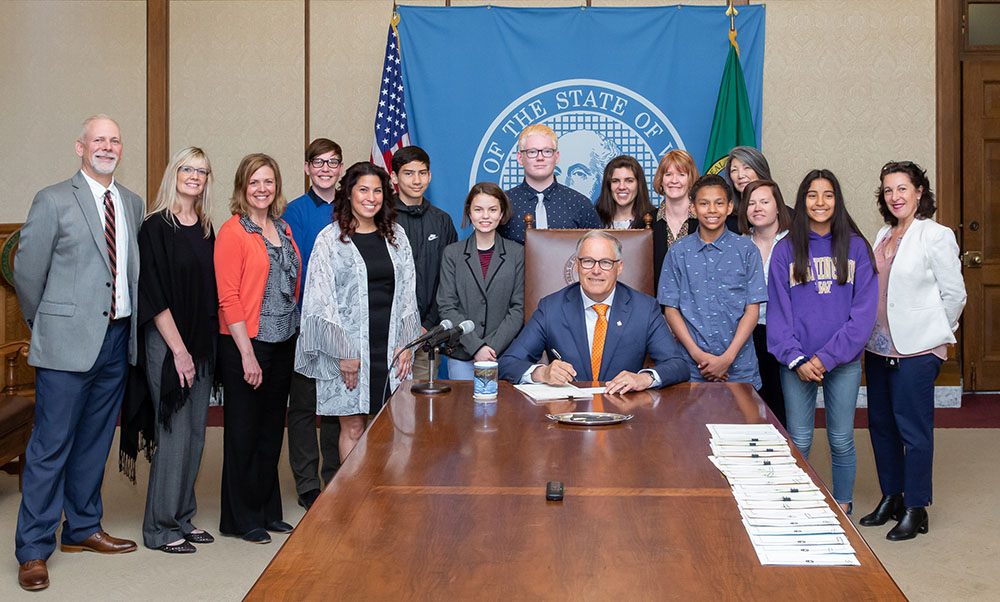
Southwest Washington Center of the Deaf and Hard of Hearing
Provides programs and services to deaf and hard of hearing individuals in SW Washington. A non-profit organization funded by the Washington Department of Social and Health Services / Office of the Deaf and Hard of Hearing, United Way, and YOU, our community partners.
Washington State Association for the Deaf
A non-profit organization that works to promote, protect and preserve the rights and quality of life of deaf and hard of hearing individuals in the state of Washington.
Washington Sensory Disabilities Service
Washington Sensory Disabilities Services (WSDS) exists to assist children who are deaf or hard of hearing, blind or visually impaired, or deaf-blind, by providing training and other support to families and service providers.
WSDS is funded by a state education agency— the Office of Superintendent of Public Instruction (OSPI)—as a state needs special education project. WSDS receives other federal and state grants to support their services as well, so they are able to offer them at little or no cost.
Washington State Office of the Deaf and Hard of Hearing
The Office of the Deaf and Hard of Hearing (ODHH) provides services to the deaf, hard of hearing and deaf-blind communities throughout Washington State. ODHH contracts with six community service centers, located in Seattle, Tacoma, Vancouver, Pasco, Spokane, and Bellingham, to provide communications access advocacy, sign language interpreter information, workshops, information and referral, counseling, outreach and independent living support services to clients and their families.
Washington State Deaf-Blind Citizens, Inc. (WSDBC)
Works to promote educational, economic, and social welfare; to encourage fellowship; to defend rights, and advance an organization in which members can participate in the discussion of problems and solutions relative to their welfare and prosperity.
American Speech-Language-Hearing Association
Hearing aids are the most common devices needed by deaf and hard of hearing people. In certain instances, some of the agencies listed can provide new or reconditioned aids free of charge or at reduced rates. Other agencies may offer assistance in obtaining these aids. In some states, Medicaid will help cover the cost of purchasing a hearing aid. Check with your health insurance company regarding its policy coverage for hearing aids. You may also wish to contact the American Speech-Language-Hearing Association (ASHA) for information on insurance coverage of hearing aids and related service. ASHA keeps abreast of current developments and change in the coverage of hearing health care expenses by private insurance, Medicaid, and Medicare.
Text Telephones (TTYs)
Telephone accessibility for deaf and hard of hearing people has improved in recent years. The Americans with Disabilities Act (ADA) Title IV requires that each state maintain a telephone relay service (TRS). These services enable TTY users to communicate with non-TTY users and have been operational since 1993. These programs are usually administered by the state agency on deafness. The state agency invites applications from residents that have a hearing loss or speech impediment.
Applicants are screened for medical and financial eligibility. Once eligibility is established, the agency may give the applicant a TTY at no charge, or may lease or sell the applicant a TTY at substantially reduced rates. In some states, the applicant is given a voucher that may be used to purchase equipment from dealers.
For more information about TTY distribution programs for your state, contact your local Vocational Rehabilitation office.
For Relay service (Voice, TTY, and Video) contact:
http://www.purplevrs.com//
For Video Relay services contact:
http://www.sorensonvrs.com
Rehabilitation Service Administration
Vocational Rehabilitation (VR) will provide service for VR clients who meet eligibility requirements. Assistance with hearing aids and devices may be provided to clients who need such devices to secure or retain employment.
U.S. Veterans Administration
All World War I veterans are eligible to receive free hearing aids. Other veterans can receive free hearing aids if their hearing loss is at least 50 percent service-related. Veterans must first contact a V.A. medical facility near their home. The veteran’s health care act provides free TeleCaption decoders to veterans who have profound hearing loss that is service-related. The V.A. will also provide TTYs and telephone amplification devices to veterans with service-related hearing loss.
Civic/Service Organizations
Many community service organizations receive charitable donations to purchase hearing aids and other devices for low income deaf and hard of hearing people. Clubs often recondition hearing aids and donate them to needy individuals. Many of these organizations are listed in your telephone directory.
The following are several organizations that typically offer this type of assistance:
- National Easter Seal Society: http://www.easterseals.com/
- March of Dimes: http://www.marchofdimes.com
- Lions Clubs International: http://www.lionsclubs.org/
- Kiwanis Clubs: http://www.kiwanis.org/
- Rotary Clubs: http://www.rotary.org/
- Sertoma Clubs: http://www.sertoma.org/
- Optimist Clubs: http://www.optimist.org/
Statewide Agencies/Programs
These agencies and programs provide service to residents of their state. Agencies may be able to provide full or partial assistance depending upon financial circumstances. Medicaid provides service to eligible recipients only. Crippled children’s services may provide hearing aids for children up to 21 years of age from low-income families.
The following are several organizations that typically offer this type of assistance:
- Medicaid
- Crippled Children’s Service
- Department of Health and Human Service: http://www.hhs.gov
- Department of Public Health (Health and Environment, etc.)
- Commission for Handicapped Children
- Commission for Deaf and Hard of Hearing People (Council for the Hearing Impaired, Office of the Deaf and Hard of Hearing, etc)
- Programs for Individual with Developmental Disabilities
- Family Service Centers
Local Agencies/Programs:
Local agencies sometimes receive donations or private funds to assist with various needs. Speech and hearing centers may provide hearing aids at a reduced rate for clients who have used their service for audiological assessment. Some areas have hearing aid banks that distribute reconditioned hearing aids to individuals ineligible for finical assistance. These banks are often affiliated with local service organizations such as:
- Child Health Centers
- Speech and hearing centers
- Organizations for older adults
- Deaf community centers
- Organizations for Deaf and hard of hearing people
- Religious organizations/institutions
- Hearing aid banks
HandSpeak: A Sign Language Dictionary Online
ASL Access
The ASL Access Video Collection consists of over 200 American Sign Language (ASL) videos available for free loan in your local library.
American Society for Deaf Children (ASDC)
Non-profit organization advocating rights and education for deaf children.
Washington State Hands and Voices
A parent-driven organization dedicated to supporting and unifying families with children who are deaf, hard-of-hearing or deaf-blind.
Gallaudet University
The nation’s only 4-year University for the Deaf. Contains a comprehensive list of deaf-related links.
National Institute of Deafness and Other Communication Disorders
Improving the lives of people with communications disorders.
National Association of the Deaf
Programs and activities include grassroots advocacy and empowerment, captioned media, certification of American Sign Language professionals. Click here to read NAD’s research about language deprivation.
SignClass ASL Classes
Learn ASL today with six easy online or in-person classes. Dr. Anne Gray Liversidge is an accredited expert on a mission to help teach ASL and create bridges between the Deaf and Hearing worlds.
Sorenson Communications
Sorenson is a global language services provider and the leader in communication solutions for the Deaf and hard-of-hearing communities.
Washington Relay Service
Washington Telecommunication Relay Services (WATRS) is also known as Washington Relay. It is a free service provided by ODHH to ensure equal communication access to telephone service for people who are deaf, deaf-blind, hard of hearing and speech disabled. This service allows hearing callers to communicate with deaf, hard of hearing, deaf-blind and speech disabled relay users and vice versa through specially trained WATRS Communication Assistants (CA).
PDX Area ASL Events & Resources
Least Restrictive Environment in Deaf Education: A Critical Examination (PDF)
The principle of Least Restrictive Environment (LRE) under the Individuals with Disabilities Education Act (IDEA) aims to ensure that students with disabilities, including Deaf and Hard of Hearing students, receive a Free and Appropriate Public Education (FAPE) in a setting that maximizes their learning potential while being as inclusive as possible. However, applying the traditional understanding of LRE, often equated with mainstreaming in general education classrooms, can be detrimental to the linguistic, cognitive, academic, social, and emotional development of Deaf and Hard of Hearing students. This white paper argues that the optimal LRE for Deaf and Hard of Hearing students necessitates prioritizing environments that foster direct communication in their preferred language (often sign language), interaction with Deaf peers, and access to specialized instruction and support.
Why the Science of Reading Policy May Not Work for Deaf and Hard of Hearing Students (PDF)
This position paper argues that the current SoR laws are unsuitable for DHH students and advocates the need for tailored approaches using the evidence that exists for language and literacy development of DHH students to meet the unique strengths, challenges, and needs of this population.

